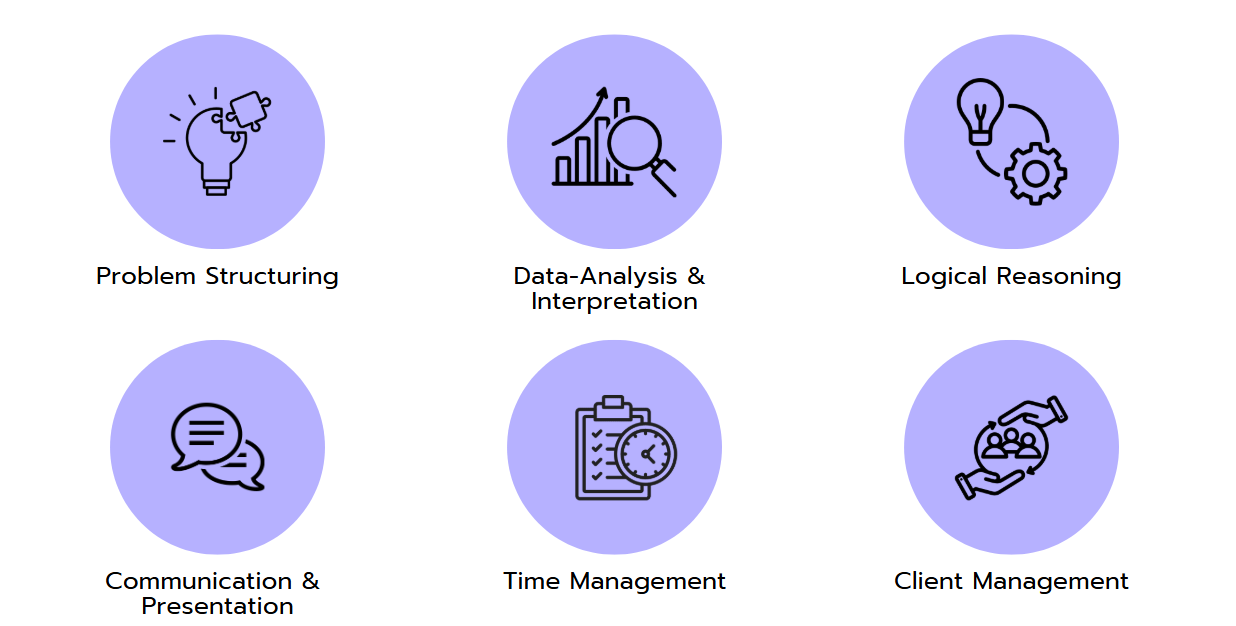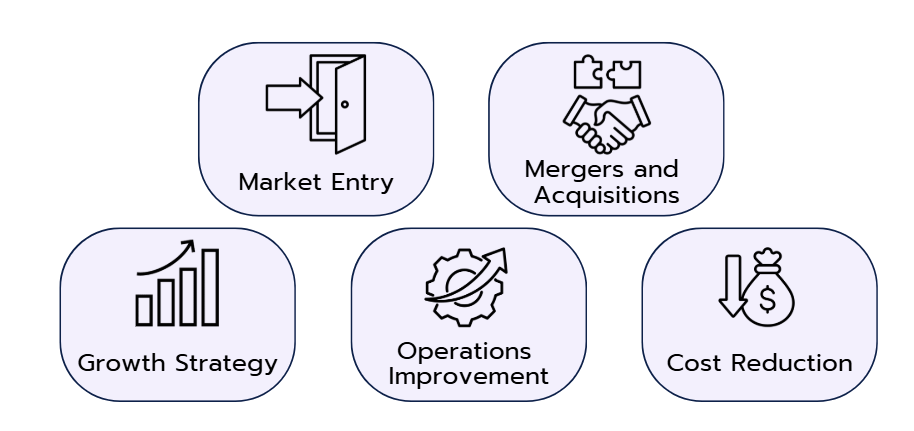Essential Skills in Candidate-Led Case Interviews
Candidate-led case interviews are designed to assess a range of skills that are essential for success in management consulting, including:

- Problem Structuring
- Data-Analysis and Interpretation
- Logical Reasoning
- Communication and Presentation
- Time Management
- Client Management
Successful candidates demonstrate the ability to think critically, adapt to new information, and synthesize data to arrive at well-supported conclusions.
Tips for Success in Candidate-Led Cases
To excel in candidate-led case interviews, consider the following strategies and best practices:
- Structure the Problem
Begin by clarifying the problem statement and defining the scope of the case. Develop a framework or roadmap to guide your analysis, ensuring that it addresses all relevant aspects of the issue. This initial structuring phase is critical, as it sets the foundation for the rest of the case. - Hypothesize and Prioritize
Form a hypothesis based on the information provided and prioritize the most critical issues or questions to investigate. This allows you to focus your efforts on the most impactful areas and demonstrate your ability to think strategically. - Request and Analyze Data
Request relevant data from your interviewer and analyze it to test your hypothesis. Be prepared to adjust your hypothesis or framework based on new insights gained from the data. Remember to always draw logical, fact-based conclusions. - Communicate Clearly and Concisely
Throughout the case, articulate your thought process, findings, and recommendations in a clear and concise manner. Practice active listening and engage with your interviewer to ensure you fully understand their questions or concerns. - Synthesize and Summarize
At the conclusion of the case, synthesize your findings and present a concise summary of your recommendations. Ensure that your final proposal is well-supported by the data and addresses the original problem statement.
Example Cases
The following premium cases will help you familiarize yourself with the candidate-led case format and practice your problem-solving skills.
Example Case 1: Hot Wheels – Part 1
In this particular scenario, the task at hand is to provide counsel to Korean Car Parts (KCP), a multinational manufacturer of original equipment for cars which is headquartered in Korea. Recently, they've been experiencing a slump in their profit margins and have enlisted our assistance to comprehend and rectify this downward trend in profitability.
Your role, as the candidate, is to comprehend that requesting a split based on product, competitor, or geographic factors is the most efficient way to advance the case. Upon receiving information that profits in the US have taken a hit, you understand that this is the area that requires investigation - a textbook example of candidate-led case leadership!
Following this, your task is to further segment the US market and request data concerning our offerings in this region or those of our competitors. Note that the interviewer will provide only the data you explicitly request, which, in this instance, pertains to both our products and those of our competitors. Based on this information, we can deduce that our client is facing challenges in the Wheels, Airbags, and Seatbelts categories.
To further the case, the candidate should strive to address the deficiencies in these three product categories, which are primarily due to slow delivery times. When it becomes clear that these issues cannot be resolved and the struggling products cannot be improved, it is concluded that these products should be phased out.
As is evident from this example, steering a candidate-led case doesn't require one to be a rocket scientist! In essence, it involves dissecting the issue into its most fundamental components, requesting relevant data, and tracing the path laid out by the data.
Example Case 2: Hot Wheels – Part 2
This case was explicitly crafted by me to serve as a counterpoint to Hot Wheels – Part 1 and to exhibit case leadership within a candidate-led scenario.
In this instance, the issue remains identical:
We are consulting for Korean Car Parts (KCP), a global original equipment manufacturer (OEM) of automobile parts headquartered in Korea. They've witnessed a downward trend in their profits recently and have sought our expertise to comprehend and tackle this dwindling profitability.
The case "divides", so to say, right from the onset. Contrary to the first case, where we noticed an increase in profits in certain geographies (Korea and Japan), here, Korean Car Parts is encountering a drop in profits across all geographies. This effectively negates the necessity for a geographic split, marking a departure from what we had to do in the initial case.
Consequently, we need to delve deeper into the macro forces at work, particularly the dynamics among competitors (since the interviewer indicates that some competitors are still flourishing).
Upon requesting the appropriate data, we are furnished with aggregate market data for products. Once again, this is on a macro level, owing to the overarching nature of the problem, unlike the first case where we had a distinctly geographic issue.
From this exhibit, we can discern that the markets for Wheels, Seatbelts, and Airbags are simply on the decline (not a result of our actions), while the remaining two products are witnessing market growth (indicating we might be making some mistakes).
This informs us that the markets for the other two products (Carburetors and A/Cs) are being dominated by competitors. Therefore, it is only natural that we inquire about the competitors in this scenario!
As we receive data about the competitors, it becomes evidently clear that the two competitors experiencing robust profit growth do not even deal in Wheels, Seatbelts, and Airbags; they either never ventured into these markets or have already exited them! Our deduction, therefore, is that Wheels, Seatbelts, and Airbags represent unappealing markets that we should consider withdrawing from.
Notice how our inference in this case mirrors that in the previous one: cease the sale of Wheels, Seatbelts, and Airbags. However, the route we took to arrive at this conclusion was different. The path diverged because the data, insights, and hints provided were different.
And there you have it, a classic demonstration of case leadership.
👉 If you want additional resources, read our article in the case-interview-basics on candidate-led cases and check out other helpful cases.
Conclusion
Mastering candidate-led case interviews is essential for aspiring management consultants. By understanding the format, honing your problem-solving skills, and practicing with example cases, you can significantly increase your chances of success in the interview process.
Remember to structure the problem, hypothesize, analyze data, communicate effectively, and synthesize your findings to demonstrate your ability to tackle complex business challenges and add value as a strategy consultant.






